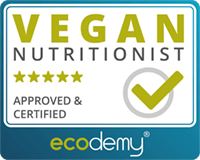Heartfelt advice from a plant-based nutritionist

Having made the decision to begin your vegan journey may have already been a difficult one. Coming across further struggles regarding your vegan nutrition surely doesn’t help. Fear not! :)
All you need is to be prepared. Being vegan requires you to take a step back and reconsider your choices and behaviour. Well, you might need to do that a little more in order to ensure that you will not be affected heavily by possible vegan-unfriendly circumstances coming your way.
Being organised and thinking ahead can ensure that you have the resources available to maintain a balanced vegan diet. It may seem like a lot at first. For any kind of change to stick, it is required that one puts in the effort and time. Like most things, it will soon become second nature and will come with little to no effort. But you need to practice. Yes, veganism needs to be practised over and over again, too.
The 12 Reasons
Here are all reasons you might be struggling to stay vegan and some tips on how to be prepared and combat them.
- Lack of support from family and friends
- Difficulty preparing vegan meals
- Not enough knowledge about vegan nutrition
- Unavailability of vegan options
- Lack of motivation to stay on track
- You’re unsure on how to shop for groceries
- You’re not holding yourself accountable
- You’re craving non-vegan food
- You have healthcare concerns about veganism
- Social pressure to eat non-vegan food
- Difficulty finding vegan restaurants
- You’re not part of a vegan community
Solutions
Now let’s try to find some solutions for each of the above.
- Lack of support from family and friends
There are two things you can do here; either try to make them adjust to your vegan eating habits or accept their lack of support altogether and move forward.
I’ve been vegan since March 2019, and I still hear about it on the dining table, so yes, it does take years for people to get accustomed to something they deem unusual.
Depending on the level of support you are looking for, you can try a few things.
- Start small by bringing vegan-friendly dishes to family get-togethers or gatherings with friends. This will allow them to adjust to your vegan lifestyle slowly.
I found out that naturally vegan things are better accepted than e. g. mock meats or vegan cheese. When you bring or make something, keep that in mind and prepare naturally animal-free foods, e. g. Taboulé.
You can also research vegan restaurants in your area and suggest going out to meals with your family and friends, for them to try something different. A good way to do this is via happycow.net.
Fun fact: I check happycow before I travel somewhere and settle for places that are close to a lot of vegan restaurants because I’m a big foodie :)
- Finally, be straightforward with them. The least they can do is respect your choices, that’s also a form of support.
2. Difficulty preparing vegan meals
Vegan cooking doesn’t have to be overly complicated. You can start by simply swapping non-vegan products like cheese, milk and butter with vegan alternatives. Supermarkets now even offer a variety of meat substitutes like soy burgers and chicken nuggets.
And if you feel like challenging yourself here are some recipes to try from scratch.
- Vegan Black Bean Burgers Recipe (allrecipes.com)
- Falafel burgers recipe | BBC Good Food
- Mushroom Nuggets — Healthy Vegan Recipes — HappyCow
There are plenty of vegan YouTubers that provide easy and delicious vegan recipes. My favourites are Pick Up Limes, Bianca Zapatka and Gaz Oakley.
Vegan cookbooks are also a great idea for discovering new recipes, too.
Get creative and make up your own recipes with ingredients you have at home. Paring grains, legumes and vegetables is a great way to get a balanced and nutritious meal. Grains are a good source of carbohydrates, legumes provide protein, and vegetables are full of essential vitamins and minerals.
3. Not enough knowledge about nutrition
Do your research online, read this blog, read books about veganism, and watch videos. There are many websites and books dedicated to learning more about vegan nutrition and how to make healthy plant-based meals. You can also consult me, a nutritionist, if you need help with meal planning.
4. Unavailability of vegan options
Not all supermarkets have an array of vegan substitutes. There are health food stores, many websites and online stores where you can purchase vegan food and ingredients.
Being vegan and on a budget can also be challenging, because anything on a budget is challenging. Try looking online for vegan meal plans and ideas that you can make with what is available in your pantry. There is no rules for cooking. Whatever you want to mix, you are allowed to mix.
When going out, not that some restaurants may offer dishes that may not be labelled as vegan, but in fact, are. You can also ask them beforehand if they can remove or swap a non-vegan ingredient for you.
5. Lack of motivation to stay on track
- Find a vegan mentor or support group to help keep you motivated.
- Set achievable goals and track your progress.
- Reward yourself for any vegan milestones you reach.
- Try out new vegan recipes to keep things interesting.
- Find recipes that incorporate your favourite ingredients.

6. You’re unsure on how to shop
Start by looking into plant-based proteins, such as tofu, tempeh, and seitan. Also, take a look at some of the meat alternatives made from chickpeas and lentils.
You may also want to explore some vegan-friendly dairy substitutes, such as almond milk, coconut milk, and oat milk.
Additionally, there are lots of vegan-friendly condiments like agave nectar and coconut aminos that can be used to make all sorts of delicious meals.
Don’t forget about fresh fruits and vegetables — they are an important part of any diet!
7. You’re not holding yourself accountable
Remember that your diet and overall lifestyle are in your hands. Set a schedule for your tasks, set achievable goals, track your progress, and break down large tasks or goals into smaller ones. Try using accountability systems such as checking in with someone else (vegan or otherwise) to report your progress regularly.
8. You’re craving non-vegan food
If you’re at the beginning of your vegan journey, be easy on yourself and allow mistakes. You don’t have to feel guilty about wanting to eat something that doesn’t fit your dietary preference or is incoherent with your values. Even if you only swap out cow’s milk with oat milk, you’ve done plenty already.
Don’t settle for too little, but don’t overreach. Balance is key.
You can either allow yourself to have those slip-offs at the beginning and eventually try to minimise them or instead of giving into those cravings, there are plenty of vegan food options you can try that will satisfy your hunger and help you stay on track with your lifestyle. The choice is yours.
Life Advice: Choosing the hard way will make your life easier later. Choosing the easy way out will make your life harder in the future.
9. You have healthcare concerns about veganism
Remember that given you are a healthy individual and your plant-based diet is balanced, you should have no issues.
Do your research, read medical articles and eventually decide whether a vegan diet suits your needs. Contact me in case you should be worried.
B12 supplements are vital for a long-term vegan diet!
10. Social pressure to eat non-vegan food
First, try to recognize that the decision to eat vegan or non-vegan food is ultimately up to you and not necessarily influenced by outside forces.
Most people take up smoking because of peer pressure or wanting to be part of a certain group. Think about whether you want to be reactive in life, or create and shape your life on your own, not giving in to any type of pressure.
Then, try to focus on what plant-based foods you enjoy, and find ways to make them as nutritious and delicious as possible.
Finally, talk to the people around you and ask them not to interfere with your dietary or health needs. At the end of the day, your close ones should respect your choices.
Because we know that pressing your ideas on people is wrong, you should also understand that accepting their pressure is, as a logical consequence, wrong to you.
11. Difficulty finding vegan restaurants
Again, try asking whether they can tweet a specific dish to match your vegan needs or check Happycow beforehand. You’d be surprised how many restaurants are in your vicinity.
Most restaurants will offer a menu with appetisers or side dishes that are indeed vegan. Consider ordering a couple of those, instead of a main dish that will most likely not be vegan.
12. You’re not part of a vegan community
One way to stay connected and motivated is to look for online vegan communities and follow vegan blogs, social media accounts, and other resources — there are so many amazing people out there sharing their stories and recipes. You could also try joining a local vegan meetup group or attending vegan-focused events.
An app that focuses on dating and friends is VegPal. I’ve made a few friends there, and in fact, my first clients I met on this app :) Happycow also has a community, but I haven’t been part of it, so I have no experience with the community there.
Having external support and encouragement from others can help strengthen your commitment to a vegan lifestyle and even try out new things you may have never thought of before.
It must be clear by now that some adjustments may be necessary. If you are dedicated to a vegan lifestyle, try to make small changes that will help you adjust to the changes in diet and lifestyle. Most importantly, remember to be kind to yourself and use any mistakes as opportunities to learn and progress. Good luck on your vegan journey!

